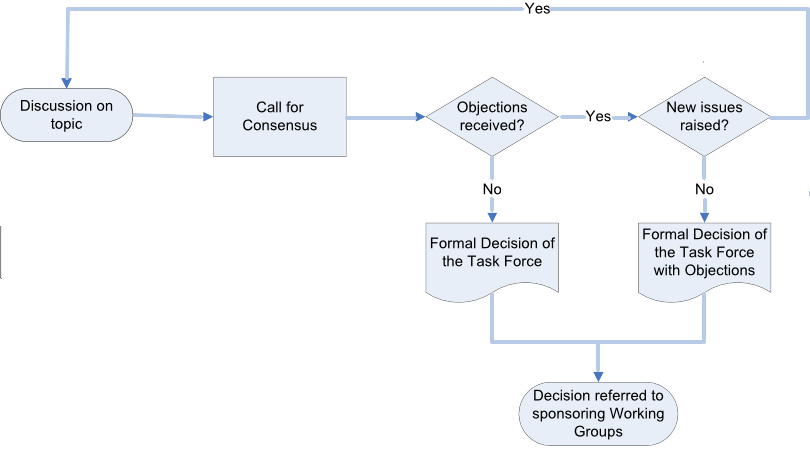HTML Accessibility Task Force Consensus Procedures
Status: This document was approved by the HTML WG on 31 October 2013 and approved by the PFWG on 23 October 2013 and replaces any previous version effective 31 October 2013. Updated $Date: 2015/03/24 23:03:32 $, by $Author: liam $
This document explains the decision process of the HTML Accessibility
Task Force.
There are often divergent opinions on issues before us. It is important
that all views are expressed and considered but it is critical to our
function that we can come to conclusions.
The Working Groups use their own procedures for how to handle the advice.
Formal decisions of the task force are advisory and do not bind the
sponsoring Working Groups to a particular course of action.
- Discussion on a topic proceeds until the facilitators believe that all
expressed points of view have been heard and considered. In order to
keep the task force moving on its topics, the facilitators normally hope
to carry out discussion for two weeks, but may allow longer discussion
time if necessary.
- When the facilitators believe that the group is ready to come to a
decision they announce a Call for
Consensus either by email to the Task Force's regular mailing
list, or as a Web-based survey. There must
be a minimum deadline of three working days, and there should be at least seven
consecutive days to respond. There should
be a scheduled teleconference with the question on the agenda during the
duration of the Call for Consensus. Comments made in a teleconference may not be considered formal comments on the
Call for Consensus - all comments should
be made in the relevant survey or email thread.
- If no objections are received by the deadline, the draft decision
becomes a formal decision of the task force.
- If objections are received but the facilitators believe the
objections have already been considered and addressed and there is
an overall consensus, the draft decision becomes a formal
decision of the task force with objections. Objections are
recorded as an appendix to the formal decision.
- If objections are received that the facilitators believe present
substantive new information, or if the facilitators believe there is
not a clear consensus in the Task Force they should
reopen the discussion.
- The Task Force facilitators notify the sponsoring Working Groups of
Formal Decisions as advice of the HTML Accessibility Task Force.
During discussion on a topic, participants are are welcome to raise
objections liberally to make sure all angles are considered. However, when
the facilitators issue a Call for Consensus, objections should
not be raised unless the individual strongly believes the
decision is the wrong one in spite of discussion, and the individual
cannot "live with" the decision. Compromise on points that the individual
considers suboptimal but can "live with" is an essential part of group
decisions that must meet various requirements.
If a participant believes the facilitators have not exercised sound
judgment in following this policy, they should express their concern first
to a chair of one of the sponsoring Working Groups, escalating if needed
to a staff contact of a sponsoring Working Group, and escalating if needed
to the W3C Interaction or Accessibility Domain Lead.


